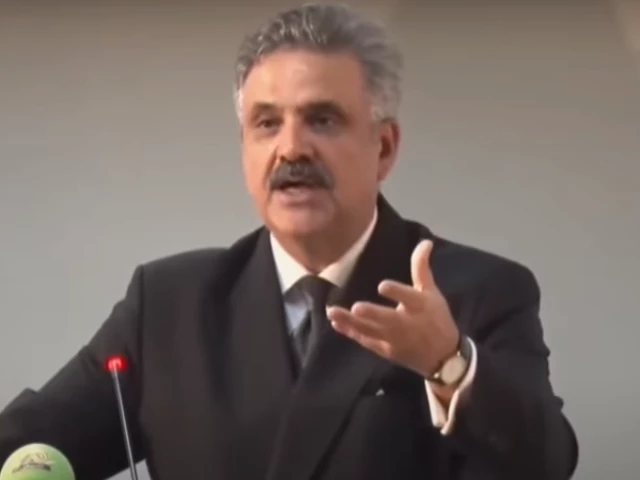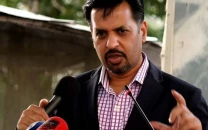CJ explains why he didn't form full court
Says nine out of 13 SC judges favoured CB over full court

Chief Justice of Pakistan Yahya Afridi has justified his action to not constitute a full court to hear petitions challenging the 26th Amendment in November last year.
The dispute began on October 31 last year, when Justice Syed Mansoor Ali Shah and Justice Munib Akhtar, being members of the committee, formally addressed a letter to CJP Afridi, urging him to hold a meeting under the Supreme Court Practice and Procedure Act 2023.
The two senior justices requested the meeting specifically to address the petitions contesting the 26th Amendment, which involves changes to judicial authority and tenure.
With no response from the CJP, Justices Shah and Akhtar held an independent meeting in Justice Akhtar's chambers to determine the next steps.
Following this private session, the two justices decided by majority vote to fix the petitions against 26th Amendment before a full court on November 4 last year.
Despite their decision, no cause was issued.
As minutes of committee meeting has been issued on the SC website, CJP Afridi's note is also attached wherein he gave justification for not constituting the full court.
The CJP said that the constitutional mandate vesting jurisdiction to any bench in the Supreme Court to hear a petition under Article 184 of the Constitution is but very clear.
The CJP had personally sought the opinion of all 13 judges of the Supreme Court, with nine favouring a constitutional bench over a full court for hearing challenges to the amendment.
The disclosure came as part of the CJP's detailed communication addressing the concerns of justices Shah and Akhtar regarding the bench composition for a key constitutional matter.
The CJP stressed that the decision reflected the collective preference of the court's majority and that he had acted in good faith to preserve institutional harmony.
Freshly disclosed minutes of judges' committee meetings covering the period from October 31, 2024, to May 29, 2025, provide a rare glimpse into the apex court's inner sanctum, laying bare a paper trail of legal hair-splitting, procedural manoeuvring and judicial diplomacy surrounding one of the most politically charged amendments in the country's recent memory.
According to the disclosures, the chief justice informed Justices Mansoor Ali Shah and Munib Akhtar of the majority view, cautioning that convening a full court could undermine collegiality among judges and expose the court to public criticism, as had happened in the recent past.
The paper trail begins with an October 31, 2024 meeting in Justice Munib Akhtar's chambers, where Justices Munib Akhtar and Mansoor Ali Shah proposed listing the case before the full court on November 4.
They acted on the perception that the chief justice was not convening a judges' committee meeting on the matter.
Later, in a November 5, 2024 letter, CJP Afridi cited Article 191A and sub-clause 4 to stress that only the judges' constitutional committee could fix such cases for hearing, and that petitions under Article 184(3) must go to a constitutional bench, not a full court.
He disclosed that he had privately canvassed the views of all 13 judges and nine agreed with his position, and these findings were shared with the two 'brother judges' advocating otherwise.
Warning that convening a full court in this instance could fray the spirit of essential collegiality and invite public criticism, as had occurred in the recent past.
Later that afternoon, the CJP's office received letters from the two judges, sealed and delivered to the Judicial Commission of Pakistan (JCP) secretary for safekeeping until the commission's November 5 meeting.
At the meeting, the CJP proposed that the commission, excluding himself, nominate members of the constitutional bench to hear the petitions, in line with Article 191A(3)(a).
November 26, 2024: committee vote
In a regular judges' committee meeting chaired by CJP Afridi and attended by Justice Shah and constitutional bench head Justice Aminuddin Khan, Justice Shah again proposed convening a full court.
The majority, Afridi and Khan, decided that the CB would hear the case.
January 17, 2025: tax case controversy
At a subsequent committee meeting, Justice Shah was absent but had earlier submitted his views on a tax-related constitutional interpretation case, suggesting it could be heard by a regular bench instead of a constitutional bench.
The CJP noted that the tax case had originally been set for January 27 before a regular bench, but a conflicting order scheduled it for January 16.
By a 21 majority, the committee decided to transfer the case to a CB and ruled that all cases involving constitutional questions must go to the CB unless a regular bench had already issued an order.
January 24, 2025: midnight roster dispute
Later, Justice Shah's letter, also made public, describes his objection to being informed at 9:33 pm, via his secretary, that a six-member larger bench, headed by Justice Jamal Khan Mandokhail, had been formed to hear an intra-court appeal.
Shah says he had earlier agreed in an informal meeting to a five-member bench of senior judges, excluding any with conflicts of interest.
According to Shah, the CJP had suggested a four-member bench, but later that night, at 9:30 p.m. via WhatsApp, he was asked to approve a six-member bench. He objected, noting that two of its members — Justices Mandokhail and Muhammad Ali Mazhar — were part of the constitutional bench and therefore should not hear the case.
Shah added that the case file was never provided to him.
May 20, 2025: delegation of powers debate
In a three-member committee meeting, Justice Shah argued that powers under the Supreme Court (Practice and Procedure) Act, 2023, could not be delegated to the registrar, as the Act contained no such provision.
He suggested replacing the word "quorum" with "majority" and filling vacancies with the next most senior judge.























COMMENTS
Comments are moderated and generally will be posted if they are on-topic and not abusive.
For more information, please see our Comments FAQ